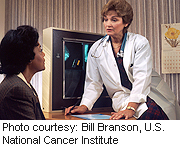- 10 Strategies to Overcome Insomnia
- Could Artificial Sweeteners Be Aging the Brain Faster?
- Techniques for Soothing Your Nervous System
- Does the Water in Your House Smell Funny? Here’s Why
- Can a Daily Dose of Apple Cider Vinegar Actually Aid Weight Loss?
- 6 Health Beverages That Can Actually Spike Your Blood Sugar
- Treatment Options for Social Anxiety Disorder
- Understanding the Connection Between Anxiety and Depression
- How Daily Prunes Can Influence Cholesterol and Inflammation
- When to Take B12 for Better Absorption and Energy
Too Few Women Get Counseling Before Breast Cancer Gene Test: Study


Only about one-third of women receive genetic counseling before they undergo testing to see if they have a gene mutation that increases their risk of breast or ovarian cancer, a new study reports.
Such counseling is important prior to undergoing genetic testing for mutations of BRCA, a gene strongly linked to the risk of both cancers, the study authors said. And actress Angelina Jolie’s revelations about discovering she had a BRCA mutation and deciding to have her breasts and ovaries removed has raised awareness about the importance of genetic tests and counseling.
In the study, patients who received genetic counseling beforehand displayed better knowledge of the process and possible results. And they reported more comfort heading into the test, according to the study results published online Oct. 1 in the journal JAMA Oncology.
“While there certainly are physicians who are capable of providing appropriate genetics counseling for their patients, there are many who are not, and many who admit they don’t feel comfortable trying to provide such counseling,” said senior study author Dr. Rebecca Sutphen. She is president and chief medical officer of InformedDNA, a national provider network of genetics specialists.
Not all experts agree with the importance of genetic counseling prior to testing, however.
An accompanying editorial in the journal questioned the value of pretest counseling, arguing that the emphasis should be placed on genetic counseling for women who have received a positive test for BRCA mutations, so they fully understand their medical options.
“I think it’s perfectly reasonable that the surgeon should order the test directly. I don’t see that, in 2015, genetic counselors add anything to the process,” said editorial author Dr. Steven Narod, director of the familial breast cancer research unit at the Women’s College Research Institute in Toronto. “If they have a mutation, they should see a genetic counselor. If they don’t, I think it just slows down the process.”
Narod also questioned the fact that the study was funded by the health insurer Aetna and conducted by researchers affiliated with InformedDNA.
“This is a paper driven by a for-profit company that sells genetic counseling services,” he said.
About 55 percent to 65 percent of women who inherit a harmful BRCA1 mutation and about 45 percent of women who inherit a harmful BRCA2 mutation will develop breast cancer by age 70, compared with just 12 percent of all women, according to the U.S. National Cancer Institute (NCI).
In addition, about 39 percent of women with BRCA1 mutations and 17 percent of women with BRCA2 mutations will develop ovarian cancer by 70, compared with 1.3 percent of all women, the NCI says.
BRCA mutations have been so strongly established as a cancer risk factor that the U.S. Preventive Services Task Force has added BRCA risk assessment and genetic counseling to its list of recommended preventive procedures. That means insurers compliant with the Affordable Care Act must pay the full cost of providing such counseling and testing if a woman has a family history of breast or ovarian cancer.
In collaboration with Aetna, researchers surveyed nearly 3,900 women whose doctors ordered BRCA testing between December 2011 and December 2012.
Slightly less than half of the women who underwent BRCA testing had a family history of breast or ovarian cancer, while slightly more than half had no personal history of breast or ovarian cancer, the researchers found.
Of those women, about 37 percent reported receiving genetics counseling from a genetics professional prior to testing, the study authors said. The most common reason reported by women for not receiving this service was the lack of a recommendation from their doctor.
The women who did receive genetic counseling by a trained genetics professional displayed greater knowledge of BRCA and expressed greater understanding and satisfaction, according to the results.
Dr. Mary Daly, chair of clinical genetics at Fox Chase Cancer Center in Philadelphia, called the low rate of genetic counseling “concerning.”
Such counseling is important to help a woman understand the implications of the test, especially since the falling cost of genetic testing means that doctors often order a test that covers dozens of genes.
“We’re no longer just doing a test for BRCA. We’re doing a panel of up to 25 different genes,” Daly said. “That makes the interpretation of the results that much more difficult.”
But only one out of every 20 women in this study came back positive for a BRCA mutation, which raises the question of whether the other 19 women received any benefit at all from the counseling they got beforehand, Narod said.
In the past, insurance companies required genetic counseling prior to testing as a cost-saving measure, to make sure that women without a family history of cancer were steered away from the then-expensive procedure, Narod said.
Women would be better served if the limited number of genetics counselors in the United States focused on helping them interpret the results of a positive test, rather than preparing them prior to the test, he said.
Women with a positive test might need to have their breasts or ovaries removed as a cancer prevention measure, or might have to undergo regular MRI screenings for cancer, Narod said. They also face passing along this knowledge of hereditary cancer risk to other female family members. By comparison, there’s no real genetic counseling required if the test comes back negative.
“The doctors are perfectly capable of ordering the test, providing the preliminary information the patient needs in order to decide whether to have the test, and interpreting a negative test,” Narod said. “The genetic counselor should focus on interpreting a positive test.”
More information
For more on BRCA mutations, visit the U.S. National Cancer Institute.
Source: HealthDay
Copyright © 2026 HealthDay. All rights reserved.










